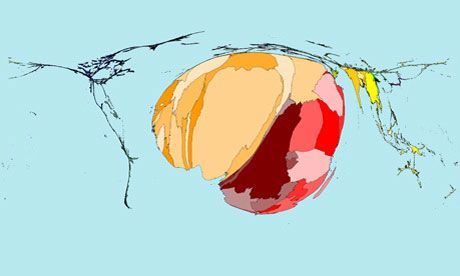harmanjit_kaur
Waheguru Waheguru
World Malaria Day: which countries are the hardest hit?

World Malaria Day: In this map, a country's size is replaced by the proportion of worldwide malaria deaths that occur there. Graphic: Benjamin D Hennig, University of Sheffield / UNICEFApril 25 is World Malaria Day.

Photograph by Hugh SturrockAnopheles Mosquito
Her abdomen full of blood that will nourish her eggs, a female Anopheles mosquito takes to the air. Her next landing may be a dangerous one—for the human who receives her bite. The female Anopheles mosquito is the only insect capable of carrying the human malaria parasite.A disease that has affected the world and its people since the beginning of recorded human history, malaria remains an entrenched global health challenge.
According to the World Health Organisation (WHO), approximately half of the world's population is at risk. But the global geography of malaria is increasingly disproportionate. The vast majority of malaria cases and malaria-related deaths occur in sub-Saharan Africa, which the director-general of the WHO, Margaret Chan, has called "the heartland of malaria." Meanwhile, "outside Africa, the malaria map is shrinking, as more and more countries eliminate malaria from their territory," says Chan.
Malaria's victims are also disproportionately children: the United Nations children's fund (Unicef) estimates that 85 percent of those who die from malaria are children under 5 years of age.
So which countries are hardest hit?
Data on malaria is notoriously patchy. The WHO only began commissioning annual reports on the state of malaria in 2008, when Chan made data collection a priority: "To maintain momentum, results must be measured."
But because most of the world's malaria deaths occur at home, in private clinics, or in informal health centres, data from government records dramatically under-reports the human cost of the disease.
According to Richard Cibulskis, co-ordinator of the WHO's global malaria programme, over 90% of the world's malaria cases are likely to go unreported. "One of the issues is that the data systems are weakest in the places where malaria is the most common," says Cibulskis. "For some countries in Africa, we don't have any good data at all."
While only 117,704 malaria deaths were officially reported in government records for 2009, the WHO estimates that closer to 800,000 people died of the disease that year.
Epidemiologists are currently hard at work preparing the next round of country-by-country estimates – a process that is long, controversial, and often heavily politicised. Some countries would prefer inflated malaria figures, while others would rather underplay the impact of the disease.
In the meantime, to mark Monday's focus on malaria, we've pulled out what we can from the most recent data – that in the 2010 World Malaria Report (pdf), released last December. The report provides estimates for the world's 106 malaria-endemic countries and highlights progress – and shortcomings – on key international targets.
Overall, the report lauds the recent "massive scale-up" in malaria-control programs – including the distribution of mosquito nets. But it also says that 2009 saw at least three African countries – Rwanda, São Tome and Principe, and Zambia – witnessed a resurgence in malaria cases, demonstrating what the report called the "fragility of malaria control".
Some highlights from the data:

World Malaria Day: In this map, a country's size is replaced by the proportion of worldwide malaria deaths that occur there. Graphic: Benjamin D Hennig, University of Sheffield / UNICEFApril 25 is World Malaria Day.

Photograph by Hugh SturrockAnopheles Mosquito
Her abdomen full of blood that will nourish her eggs, a female Anopheles mosquito takes to the air. Her next landing may be a dangerous one—for the human who receives her bite. The female Anopheles mosquito is the only insect capable of carrying the human malaria parasite.A disease that has affected the world and its people since the beginning of recorded human history, malaria remains an entrenched global health challenge.
According to the World Health Organisation (WHO), approximately half of the world's population is at risk. But the global geography of malaria is increasingly disproportionate. The vast majority of malaria cases and malaria-related deaths occur in sub-Saharan Africa, which the director-general of the WHO, Margaret Chan, has called "the heartland of malaria." Meanwhile, "outside Africa, the malaria map is shrinking, as more and more countries eliminate malaria from their territory," says Chan.
Malaria's victims are also disproportionately children: the United Nations children's fund (Unicef) estimates that 85 percent of those who die from malaria are children under 5 years of age.
So which countries are hardest hit?
Data on malaria is notoriously patchy. The WHO only began commissioning annual reports on the state of malaria in 2008, when Chan made data collection a priority: "To maintain momentum, results must be measured."
But because most of the world's malaria deaths occur at home, in private clinics, or in informal health centres, data from government records dramatically under-reports the human cost of the disease.
According to Richard Cibulskis, co-ordinator of the WHO's global malaria programme, over 90% of the world's malaria cases are likely to go unreported. "One of the issues is that the data systems are weakest in the places where malaria is the most common," says Cibulskis. "For some countries in Africa, we don't have any good data at all."
While only 117,704 malaria deaths were officially reported in government records for 2009, the WHO estimates that closer to 800,000 people died of the disease that year.
Epidemiologists are currently hard at work preparing the next round of country-by-country estimates – a process that is long, controversial, and often heavily politicised. Some countries would prefer inflated malaria figures, while others would rather underplay the impact of the disease.
In the meantime, to mark Monday's focus on malaria, we've pulled out what we can from the most recent data – that in the 2010 World Malaria Report (pdf), released last December. The report provides estimates for the world's 106 malaria-endemic countries and highlights progress – and shortcomings – on key international targets.
Overall, the report lauds the recent "massive scale-up" in malaria-control programs – including the distribution of mosquito nets. But it also says that 2009 saw at least three African countries – Rwanda, São Tome and Principe, and Zambia – witnessed a resurgence in malaria cases, demonstrating what the report called the "fragility of malaria control".
Some highlights from the data:
- Worldwide, there were 236,863,095 suspected malaria cases in 2009, nearly half of which – 111,095,796 – were recorded in south-east Asia
- Meanwhile, there were 81,735,305 "probable and confirmed" malaria cases in 2009, the vast majority of which – 68,925,435 – were recorded in Africa
- Uganda and Kenya were the countries with the highest absolute numbers of probable and confirmed malaria cases in 2009, with some 9.8 million and 8.1 million, respectively
- Of the world's 117,704 in-patient malaria deaths in 2009, 111,885 occurred in Africa
- The Democratic Republic of the Congo recorded the highest number of in-patient malaria deaths – 21,168 – followed by Ivory Coast and Angola
